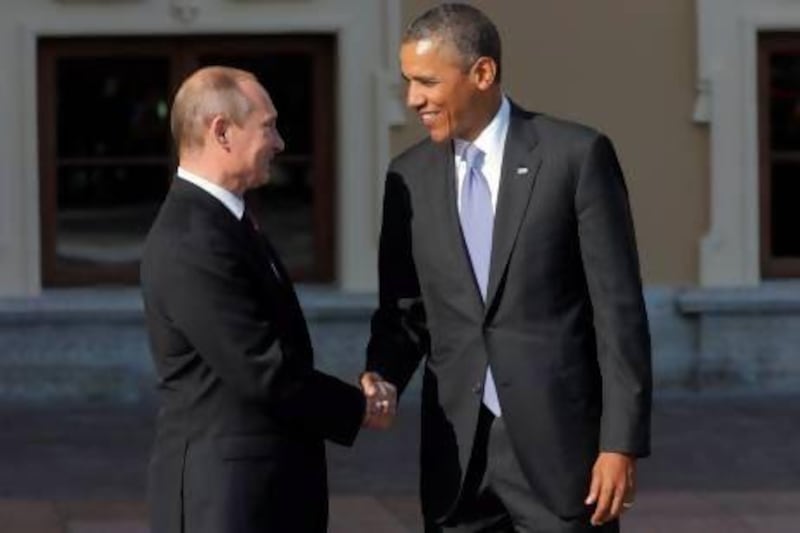LONDON // Leaders of the world's 20 richest nations gathered in St Petersburg, Russia yesterday for a summit overshadowed by Syria's civil war and warnings against attacks on the Assad regime.
In his opening remarks, Russian president Vladimir Putin said he had resisted calls to include Syria on the agenda, which would focus on sustaining economic growth across the industrialised world.
But Mr Putin did accept the issue would be discussed over a working dinner for leaders last night.
The US Congress is expected to vote next week on whether to support president Barack Obama's call for strikes against Syria in response to chemical weapons attack in Damascus on August 21.
Mr Obama arrived at the summit yesterday afternoon to be greeted by Mr Putin, who opposes any action against Syria that does not have UN backing. Russia is one of Syrian president Bashar Al Assad's key backers.
Mr Putin has challenged Washington to make a clear case that proves the regime used chemical weapons on its own people.
Mr Obama is seeking support from G20 leaders for limited strikes, a plan backed by France but increasingly shunned by the international community. The US says the gas attacks near Damascus killed more than 1,400 people.
Russia is supported by China, another permanent member of the UN's Security Council with veto power to prevent any UN backing of military strikes.
China's deputy finance minister, Zhu Guangyao, yesterday said Beijing opposed any intervention not sanctioned by the UN Security Council, in part because of the effect it would have on the global economy.
"Military action will have a negative impact on the global economy, especially on oil prices. It will cause a hike in oil prices," Mr Zhu said.
The Brics nations (Brazil, Russia, India, China and South Africa), the leader of the Roman Catholic Church Pope Francis and the UN are also wary of military action.
UN peace envoy to Syria, Lakhdar Brahimi was in St Petersburg for talks on the sidelines in an attempt to revive efforts to convene the international peace conference first mooted in May.
Ban Ki-moon, the UN's Secretary General, said it was more important than ever to push for the conference.
"While the world is focused on concerns about the possible use of chemical weapons in Syria, we must push even harder for the international conference on Syria to take place in Geneva," he said. "A political solution is the only way to end the bloodshed in Syria."
In a letter to Mr Putin, released yesterday, Pope Francis said: "To the leaders present, to each and every one, I make a heartfelt appeal for them to help find ways to overcome the conflicting positions and lay aside the futile pursuit of a military solution."
Further European opposition to military strikes came yesterday from the European Council president Herman Van Rompuy and European Commission president Jose Manuel Barroso.
"There is no military solution to the Syrian conflict," Mr Van Rompuy said ahead of the summit
The tensions between Russia and the US over Syria were highlighted yesterday when the US ambassador to the UN, Samantha Power, accused Russia of holding the UN Security Council "hostage" over the chemical weapons crisis.
Syrian foreign minister Walid Al Moualem will travel to Moscow for talks with his Russian peer Sergei Lavrov on Monday, the Russian foreign ministry said. It said talks would focus on "the current situation in Syria".
The G20 summit's agenda is supposed to focus on sustaining economic growth across the developed world.
For the first time since the bloc started meeting in 2008, there is growing confidence in banking systems whose unregulated practices had precipitated an economic crisis western countries are only gingerly emerging from.
Of more concern this year is slowing growth in developing countries.
* With additional reporting by Reuters and Agence France-Presse
twitter: For breaking news from the Gulf, the Middle East and around the globe follow The National World. Follow us





